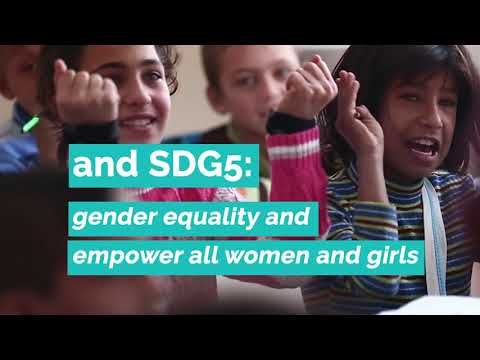Transformative political leadership for girls’ education
New report
Launching today - new research reviewing global evidence on how political leadership can be leveraged for girls' education. The research is the latest to be published through the Leave No Girl Behind Campaign - a global call to action for 12 years of quality education for all girls.
As ministers convene for the 43rd session of the Human Rights Council (24 February - 20 March 2020) at the United Nations in Geneva, a new research report and policy note - Transformative political leadership to promote 12 years of quality education for all girls - are today being launched. The research is the latest to be published through the Platform for Girls’ Education as part of the Leave No Girl Behind Campaign - a global call to action for 12 years of quality education for all girls, especially the most marginalised.
With the turn of 2020 setting the clock ticking on the 10-year countdown to achieve the 2030 Sustainable Development Goals (SDGs), including SDG 4, quality education for all, and SDG5, gender equality, the publication of this research in the opening days of the Human Rights Council is a timely reminder of the world’s promise to deliver on every girl’s right to quality education.
How can political leadership promote 12 years of quality education for all girls?
In spite of progress made in the last decade, millions of girls around the world are still denied their right to learn. When girls can fulfil their right to education they acquire knowledge and skills that help them take ownership of their futures.
Global commitment to girls’ education is at an all-time high. However, political momentum is not being sufficiently translated into reforms that will put us on track to achieve our Global Goals by 2030. The world is failing to deliver on its promise of quality education, and girls remain the most marginalised.
The report and policy note, drawing on research undertaken by the Research for Equitable Access and Learning (REAL) Centre, University of Cambridge, responds to an urgent need to identify the ways in which this global commitment can be harnessed to generate bold and urgent action for girls’ education.
The research draws on a whole-system and transformative leadership approach to outline a framework for understanding the influence of political leadership on girls’ education, highlighting the underpinning factors and role of national planning and financing in advancing gender equality in education. It provides recommendations on how political leadership can be leveraged to help achieve 12 years of quality education for all girls.
A new wave of activism for girls’ education
On International Day of Education, a new phase of advocacy for girls’ education was unleashed through the Leave No Girl Behind Campaign. The campaign aims to galvanise increased financial investment, political will, and the implementation of proven interventions to ensure that every girl gets the education she needs to transform her life and secure her future.
Established in 2018, the Platform for Girls’ Education is one dimension of the Leave No Girl Behind Campaign, comprising a group of 12 influential figures with a shared commitment to ensuring all girls get the quality education they need.
In 2019, the Platform published its first report, examining the state of girls’ education in the Commonwealth. The research highlights specific actions and interventions to dismantle the complex barriers that prevent too many girls from completing 12 years of quality education. This was followed by a second paper on Gender-Responsive Education Sector Planning. The report and policy note released today point to key areas through which political leadership can play an instrumental role in delivering on commitments to girls’ education.


